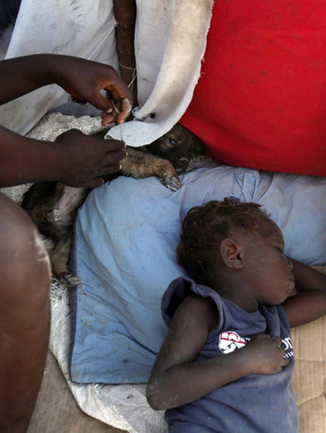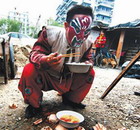Global General
'Orphans' in Haiti case all have parents
(China Daily)
Updated: 2010-02-22 08:27
 |
Large Medium Small |
Many kids in country go to orphanages when parents can't cope: Pastor
PORT-AU-PRINCE, Haiti: Although a US church group said it was trying to rescue 33 "orphans" by taking them out of earthquake-ravaged Haiti, all of the children have close family still alive.
A reporter's visit on Saturday to the rubble-strewn Citron slum, where 13 of the children lived, led to their parents, all of whom said they turned their youngsters over to the missionary group voluntarily in hopes of getting them to safety.
Similar explanations were given by parents in the mountain town of Callabas, outside Port-au-Prince, who said on Feb 3 that desperation and blind faith led them to hand over 20 children to the Baptist group.
Her husband and other parents said they relinquished their children to the US missionaries because they were promised safekeeping across the border in a newly established orphanage in the Dominican Republic.
Their stories contradict the missionaries' still-jailed leader, Laura Silsby, who said on the day after her arrest that the children were either orphans or came from distant relatives.
"She should have told the truth," said Jean Alex Viellard, a 25-year-old law student from Citron who otherwise expressed admiration for the missionaries.
He took them cookies, candies and oranges during their nearly three weeks of detention before eight of the 10 were released Wednesday on their own recognizance and flew home to the US.
 A boy sleeps next to a dog at a makeshift camp in Port-au-Prince February 20, 2010. [Agencies] |
The Americans, most from an Idaho church group, were charged with child kidnapping for trying to remove the children without the proper documents to the Dominican Republic in the post-quake chaos.
Silsby had been working since last summer to create an orphanage. After the quake, she hastily organized a self-styled "rescue mission," enlisting missionaries from Idaho, Texas and Kansas.
She was led to Citron by Pastor Jean Sainvil, an Atlanta, Georgia-based Haitian minister who recruited the 13 children in the slum. Sainvil had been a frequent visitor to the neighborhood of unpaved streets and simple cement homes even before more than half of the houses collapsed in the quake.
"The pastor said that with all the bodies decomposing in the rubble there were going to be epidemics, and the kids were going to get sick," said Regilus Chesnel, a 39-year-old stone mason.
Chesnel's wife, 33-year-old Bertho Magonie, said her husband persuaded her to give away their children - ages 12, 7, 3, and 1 - and a 10-year-old nephew living with them because their house had collapsed and the kids were sick.
"They were vomiting. They had fevers, diarrhea and headaches," she said, leaning against the wall of the grimy two-room hovel the couple shares.
In a telephone interview from the US on Saturday, Sainvil confirmed the Chesnels' story. He said a collapsed building adjacent to where the children lived held six or seven corpses.
Sainvil said what Silsby was doing did not constitute adoption "because the parents had the right to go visit their children or take them back when their situation changed."
The pastor said his deeds are often misunderstood by people in the developed world who don't realize that more than half of the 380,000 children in Haiti's orphanages are not orphans. Many have parents who - even before the quake - were simply unable to care for them.
The problem is that some of the "orphans" end up as sex slaves or become domestics who work for food, shelter and sometimes school. Fearing more such abuse of children after the quake, Haiti's government banned all adoptions except those approved before the quake.
AP












